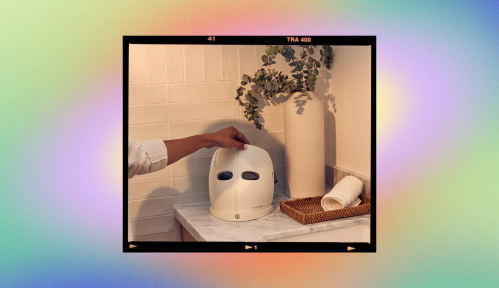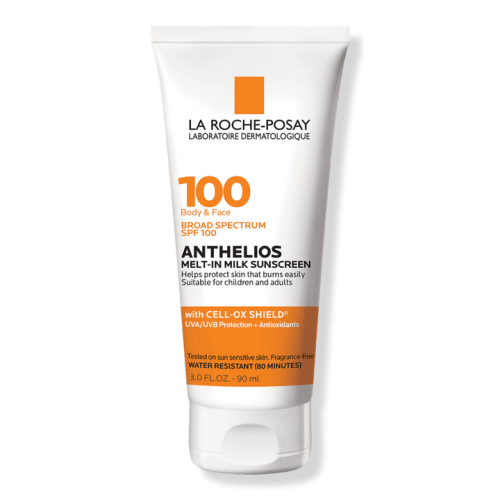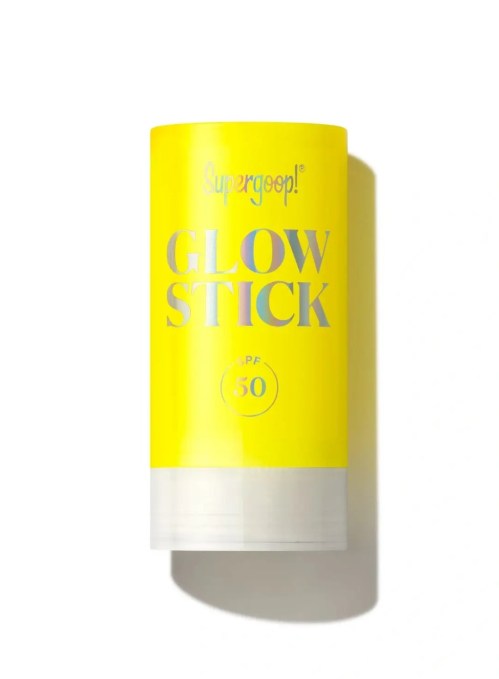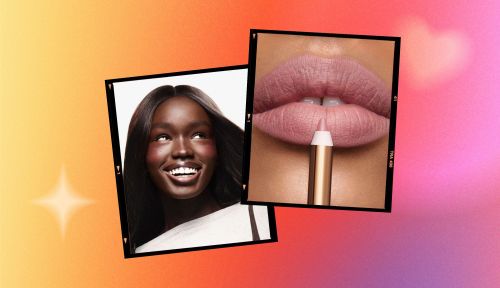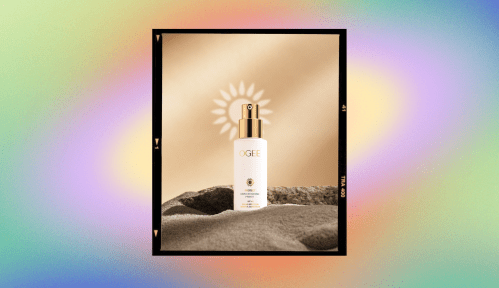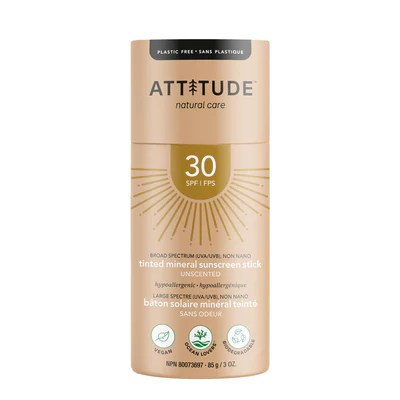Our editors independently select these products. Making a purchase through our links may earn Well+Good a commission
Is Chemical Sunscreen Safe? What Derms Want You To Know About Sunscreen Spray and the Banana Boat Recall
The Banana Boat recall has left many wondering if chemical sunscreens are safe. Here's what you should know.

For years, chemical sunscreens have been under scrutiny due to safety concerns. We’ve known for a long time that their ingredients are able to enter our bloodstream (more on that in a second), and these fears were amplified when Banana Boat voluntarily recalled three batches of its Hair & Scalp Spray SPF 30 on Friday, July 29, after trace amounts of benzene, a known carcinogen that’s been linked to leukemia at high levels of exposure, were found in the products.
Experts in This Article
board-certified dermatologist based in Cambridge, Massachusetts
board-certified dermatologist specializing in medical and cosmetic dermatology
While it sounds scary, it doesn’t necessarily mean that chemical sunscreens are unsafe. There’s a lot of (super-sciencey) stuff to unpack here, so let’s get to it.
How chemical sunscreens got their questionable reputation
Chemical sunscreens use blockers like avobenzone, homosalate, octinoxate, and oxybenzone to absorb ultraviolet rays and convert them to heat. A small 2019 study conducted by the Food and Drug Administration (FDA) on 24 participants found that as these ingredients sink into our skin, they also sink into our bloodstream at levels higher than the threshold the agency set back in 2016. However, the FDA was quick to say “these results do not mean that the ingredients are unsafe.”
So why all the drama? Part of the controversy around chemical sunscreens comes back to the naming. The word “chemical” is scary to some, even though many innocuous ingredients, like water, are chemicals.
“‘Mineral’ and ‘chemical’ isn’t a great dividing line because it yields a number of confusing myths, ” says Ranella Hirsch, MD, a board-certified dermatologist in Boston. She instead prefers using “organic” and “inorganic,” which sounds less vilifying (the main difference here is that organic compounds contain carbon while inorganic ones do not).
What to know about the Banana Boat recall
Benzene, which was found in trace amounts in Banana Boat’s recalled products, is not one of these common chemical blockers. It’s a carcinogen that’s banned as an ingredient in products intended for use in the home, and is never purposely included in SPF formulations.
“Benzene in high levels can cause leukemia, which is a cancer of the blood,” says Shirley Chi, MD, a board-certified dermatologist in Southern California. “It is most easily absorbed by breathing it in, but it can also be absorbed by contact on the skin. So having it in sunscreens is a major issue, and even worse if it is in a spray-on sunscreen that can be inhaled into your lungs.”
This isn’t the first time benzene has been found in sunscreens. Last summer, Johnson & Johnson recalled five sunscreens (four from Neutrogena, one from Aveeno) that were also found to contain benzene. The compound wasn’t intentionally added to any of these sunscreens, but was rather “discovered as a contaminant during the production process,” says Dr. Chi. “In the case of spray-on sunscreen, it seems to be found in the propellant,” she adds. In other words, no one is putting benzene in sunscreen—it’s something that can develop during production.
Following the J&J news, a team of dermatologists examined data from National Health and Nutrition Examination Surveys from 2003 to 2006 and 2009 to 2018, and their research found that sunscreen use is not associated with increased blood concentrations of benzene among adults in the United States.
“Sunscreen users of any frequency were less likely to have elevated blood concentrations of benzene compared to never users, suggesting that risk of systemic benzene exposure from sunscreen use may be low,” reads the paper. “It is possible that other factors may more strongly influence systemic benzene concentrations, including gasoline emissions, second-hand cigarette smoke, chemical products, and occupational exposures. Although quality control screening of sunscreen products is important, addressing other sources of benzene may be more beneficial from a public health standpoint.”
Dr. Hirsch notes that benzene exposure is in many ways, unavoidable.
“Benzene is an organic chemical compound widely used in industry. It has multiple industrial uses including the production of other chemicals involved in the making of plastics, resins, nylons, detergents, and drugs, among other things. It is also found in a number of foods naturally in trace amounts and is also produced naturally by forest fires, burning a candle, and volcanos,” says Dr. Hirsch. “The reality is that we have exposure to trace benzene in many situations, including pumping gas for your car, far more than would be from a contaminant such as this.”
So while reducing benzene exposure is beneficial, you will likely be fine if you have used one of Banana Boat’s contaminated sunscreens. However, in accordance with the recall, the Food and Drug Administration recommends stopping the use of the following contaminated products:

According to a statement from Edgewell, Banana Boat’s parent company, even though the brand is pulling its contaminated lots off shelves, it isn’t aware of anyone who’s been harmed.
“To date, Edgewell has not received any adverse events related to this recall and we are conducting this recall out of an abundance of caution and are advising consumers to stop using the affected product immediately and appropriately discard,” reads Banana Boat’s website. The bottom line is that brands don’t want dangerous products on the market, which is why they operate with extreme caution, and why recalls (like this one) happen in the first place.
If you purchased any of the contaminated Banana Boat products, you are eligible for a refund and can get more information here.
Are chemical sunscreens safe?
If you’re still a bit spooked, know that this isn’t a chemical versus mineral sunscreen situation: The through line among the recalled products from both Banana Boat and J&J is that they were all aerosols that were contaminated with benzene during the production process. And one thing worth noting? Even if there is benzene in other aerosol products on the market that has yet to be discovered, the concentrations are likely so low that you won’t be exposed to it at a harmful level.
“The reality is that modern life has a certain exposure to benzene with a number of factors that are especially germane—Are you a factory worker where it is used in high volume as a solvent? Do you park a car in a garage? Are you a firefighter? All of these are examples where you would have a more significant exposure than what might be potentially possible from a trace contaminant,” says Dr. Hirsch. “Sunscreen is a highly regulated product and is regulated as a drug here in the U.S. It is known to reduce the actual and well-established risks of UV radiation.”
But if you want to be extra cautious, your best bet is to avoid aerosol sunscreens.
“My feeling is that since we know that benzene is absorbed more easily by inhalation, it would be best to avoid spray-on sunscreens altogether,” says Dr. Chi. “If you want to be absolutely safe, you can choose the stick sunscreens as they are solid bars and therefore the least likely to be contaminated by benzene. That is what I use on my kids.” She also notes that cream and lotion SPFs are a great choice, and what she uses on herself.
Shop three non-aerosol sunscreens below
Anthelios Melt-in Milk Body & Face Sunscreen Lotion SPF 100 — $27.00
This mineral sunscreen is great for use all over. It’s also made with thermal spring water to soothe and nourish the skin.
Supergoop! Glow Stick SPF 50 — $25.00
This stick is made with chemical UV blockers and is designed to make applying sunscreen on the go super easy. Use it on face, chest and shoulders.
Attitude Tinted Mineral Sunscreen Stick SPF 30 — $19.00
This tinted mineral sunscreen stick is made with coconut oil and shea butter to boost hydration and leave your skin feeling smooth and nourished.
Watch our senior beauty editor incorporate SPF into her makeup routine:
Want even more beauty intel from our editors? Follow our Fineprint Instagram account for must-know tips and tricks.
Sign up for the Well+Good SHOP Newsletter
Get exclusive deals on wellness, beauty, fitness, and food products that have been hand-picked by our editors.
Got it, you've been added to our email list.

